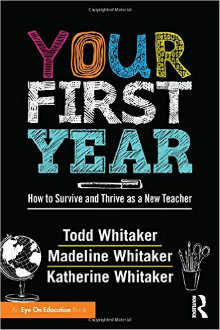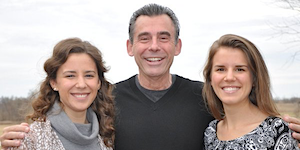1st Year Teaching Advice from the Whitakers
Your First Year: How to Survive and Thrive as a New Teacher
By Todd Whitaker, Madeline Whitaker Good, and Katherine Whitaker
(Routledge/Eye On Education, 2016)

Don’t smile until after Thanksgiving. We’ve all heard this “old teacher’s tale” of how to begin a school year, and those of us who were ever too unstructured at the start know where that adage came from. Our students were in chaos by Halloween.

They don’t address post-Thanksgiving smiles, but they do get to the heart of what haunts many first year teachers: control and structure.
What you’ll find in the book
The Whitakers take every opportunity to set new teachers up for success by weaving a constant narrative of it’s easier to become less structured in the future than to become more structured. Though I’ve read many new teacher manuals, I’ve never come across one that cuts to the chase in quite this way.
I’ve always felt books like this were limited in their usefulness because it was usually difficult to determine if a suggestion was grade dependent or just good practice. But this isn’t one teacher’s perspective, and readers receive representative examples across grade levels.
The resounding advice, however, works for all levels: “The tighter your procedures are, the less misbehavior will occur and the calmer and more productive the environment will be.”
We hear confident voices
There is a clear confidence that emerges as the authors use research to support their educational philosophies. This allows them something that I absolutely loved – words and phrases like “always” and “never” and “consistently” and “explicitly state it.”
Though educators are known to disagree with each other on all kinds of levels, it is refreshing that the Whitakers have their own non-negotiables which are educationally sound but also clearly personal. They write: “All students matter and all students have a capacity to learn. Do not let your excuses prevent your students from living up to their full potential.”
In sum: the Whitakers don’t try to tell you the only way to do something, but they do make it clear that you should be consistent with what you implement.
The final chapter begins with a sentence that encapsulates the Whitakers’ philosophical vantage point: “Teaching is so fascinating,” implying a reflective mindset that is so often missing from beginning teachers, simply because surviving the day-to-day reality is daunting.
This book is the perfect missive for the “newbie” because in almost every example, the content is differentiated so that any teacher can implement the strategies and the authors offer to-the-point guiding questions to help keep teachers on the right track.
Solid common sense advice
As an experienced teacher and mentor, I did not find any groundbreaking suggestions in this book. If this sounds dismissive, it’s not at all. Keep reading.
What I found was an assertion of common sense, confident and consistent actions, and a reflective heart. Those ideas in themselves may be found elsewhere, but when taken together and woven into narratives that are authentic and insightful, the result is fantastic.

Summer reflections on our practice
As the school year winds down, this book begs the question, “How have my actions impacted the learning of my students?” This question can sting, and we all have students we know we could have done more for. But the Whitakers would remind us that we will begin again, and if we are reflective and deliberate in our decisions, we will grow as educators.
Survey your classroom and think about what works and what doesn’t, what expands curiosity and creativity and what impedes it. The Whitakers remind us that though we are seeking a student centered educational atmosphere, we can only achieve that admirable goal if there is an organized, consistent adult at the center, facilitating educational opportunities.
Find the second edition of Your First Year here.
Amber Chandler is a National Board Certified middle school teacher and the author of The Flexible ELA Classroom 2024’s Everything New Teachers Need to Know But Are Afraid to Ask. She is an adjunct professor at Canisius College where she teaches “Differentiating Instruction.” Amber blogs regularly for ShareMyLesson and Getting Smart, contributes to AMLE Magazine, and provides NBCT candidate support for the National Board for Professional Teaching Standards. She is inspired by project-based learning and is the recipient of a Novo Foundation grant to make a documentary about her students’ journey in creating a positive online identity. Follow Amber on X-Twitter @MsAmberChandler and join her website Do You Differentiate for practical tips and resources.



































Watch for our excerpt from Your First Year, coming in a few weeks!